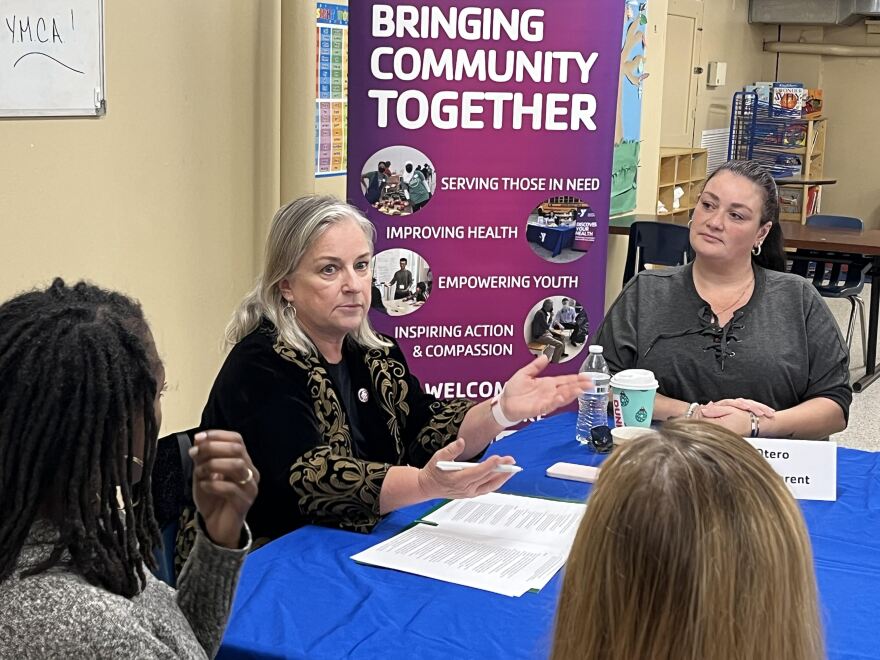- U.S. Rep. Susan Wild, D-Lehigh Valley, was host for a roundtable discussion on the child care crisis Tuesday at Bethlehem YMCA
- Wild said she worries Congress will not approve President Biden's request for $16 billion in supplemental child care funding
- Lack of government funding may cause 70,000 child care providers to close, she said
BETHLEHEM, Pa. — Cleo Otero is a single mother of four hanging from the fraying end of her child care rope.
As she spoke Tuesday, U.S. Rep. Susan Wild, D-Lehigh Valley, listened.
Otero’s concerns, which came straight from a single sheet of paper, came straight from her heart.
And straight from her empty pocketbook.
Otero poured out her worries at a roundtable discussion on America’s child care crisis that Wild convened at the Bethlehem branch of the Greater Valley YMCA.
The child care center near Otero’s home in Bath closed in 2021 because of staffing shortages caused by low wages. That left Otero's daughters — then ages 5 and 4 — with nowhere to be during the work day.
“Whether you're a single parent or two parents in the home, you need help with child care."Parent Cleo Otero of Bath
Otero has worked in the social services sector helping autistic adults. But she said she works no more.
She said she can’t find an 8 a.m. to 4 p.m. shift, and can’t find a child care facility within 30 minutes of her home to enroll her 16-month-old daughter.
So Otero stays home to care for the child.
“I’m worried about her not getting the opportunities my older kids had with child care,” Otero said. “I’m struggling, worrying about her hitting milestones. Something has to be done to help.”
'I'm worried'
Otero said she prays help will come with Congress’s passing of the Biden Administration’s request for $16 billion in supplemental child care funding to keep the providers from closing their doors.
Over the past two years, more than 220,000 child care programs received federal assistance through the American Rescue Plan’s Child Care Stabilization Program.
Now, many of those same providers are at risk of closing after the $24 billion in COVID-19 relief funds expired last month.
“I’m sure there are members of Congress who feel families and children are the most important part of this country. But they also come from a position that child care is a family issue, so let them handle it. I don’t feel that way.”U.S. Rep. Susan Wild, D-Lehigh Valley
The supplemental funding is projected to bring $504 million to Pennsylvania, affecting about 7,000 providers that serve 375,900 children.
Families whose parents and caregivers both work need help with child care, the roundtable was told. Such funding would help.
But Wild said she wasn't sure of next week’s vote on the requested funding.
“Well, I’m worried — worried,” she said. “I hate to be a pessimist; I’m always an optimist.
“But all signs are [Congress] will slash the domestic budget. That worries me an awful lot. People that will be hit hardest are the lower income families and working families, often called the working poor.
“I’m sure there are members of Congress who feel families and children are the most important part of this country. But they also come from a position that child care is a family issue, so let them handle it.
"I don’t feel that way.”
'That $16 billion will help'
Long before the coronavirus pandemic, the child care sector was fraught with inequities — in availability and affordability of care, in who has access to care, and in pay and benefits for providers, experts say.
The child care relief resources helped to stem that tide.
Now, that financial help remains in doubt if pandemic-era subsidies are not replaced.
More than 70,000 child care providers who benefited from the subsidies are likely to close as a result of lost funding, according to estimates from The Century Foundation, a Washington, D.C.-based think tank.
Such closures would affect 3.2 million children and slash $10.6 billion in revenue from lost worker productivity as parents reduce hours or leave jobs in the scramble to find new child care.
“This supplemental funding will help so many families who want high-quality, affordable child care. Without the funding, we’re not able to serve all the kids we need to serve. That $16 billion will help.”Kimberly Early, senior director of public policy and advocacy or the Pennsylvania Association for the Education of Young Children
Kimberly Early, senior director of public policy and advocacy or the Pennsylvania Association for the Education of Young Children, was among those at the roundtable discussion.
“This supplemental funding will help so many families who want high-quality, affordable child care,” Early said. “Without the funding, we’re not able to serve all the kids we need to serve.
“That $16 billion will help.”
'No one has taken a 30,000-foot view'
Pamela Cho, vice president of the Early Learning Resource Center in Allentown, said child care funding was among the positives to come out of the pandemic.
“We’re tasked with helping families find affordable child care,” Cho said. “We also work with providers to improve their child care. But it's harder to place children due to shortages and programs closing.
“And, on average, a child care provider in Pennsylvania makes about $12.43 per hour.” That's less than $26,000 a year.
After touring the YMCA’s child care wing, Wild emphasized her desire for Congress to focus on child care in a way like never before.
“I see our child care system in the country has developed like a patchwork quilt since the 1960s, when moms weren’t going to work,. Today, moms are working. But the country hasn’t adapted to that in terms of child care. No one has really taken a 30,000 foot view of it.”U.S. Rep. Susan Wild, D-Lehigh Valley
“I see our child care system in the country has developed like a patchwork quilt since the 1960s, when moms weren’t going to work,” Wild said.
“Today, moms are working. But the country hasn’t adapted to that in terms of child care. No one has really taken a 30,000-foot view of it.”
Wild has worked with fellow members of Congress on a bill titled The Child Care for Working Families Act. Among other benefits, the act would make available grants to child care centers for training and for attracting additional employees.
“We need to make sure child care providers get paid what they deserve,” she said. “Every parent wants to know their child is well cared for. Yet we don’t pay the providers what is commensurate with their job.”
Otero removed her hands from the figurative child care rope. She ran a hand across her forehead.
“Whether you're a single parent or two parents in the home, you need help with child care,” she said.
“Without it, I don’t know what I’m going to do.”


